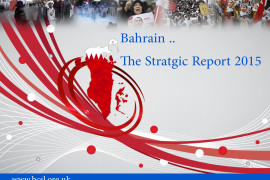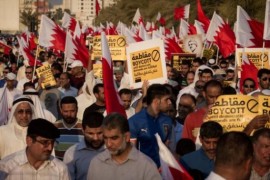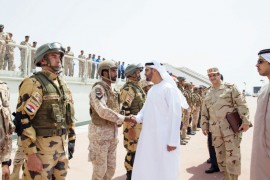What mystery lies behind the migration of Sunni Arabs from Bahrain to Qatar? And how is this related to the Gulf Qatari relations? At a time whenBahraini authorities chose to threaten those displaced to Doha instead of calming them down and while pretending to shed tears on Sunni immigrantsin an attempt to manipulate their feelings, the ultimate goal of Bahrain’s regime is concentrated in throwing its internal problems on the outside and increasing the Gulf pressure on Qatar.
By making use of the regional circumstances that are against Doha on one hand and the surroundings that are full of sectarianism on the other hand,Manama authorities continued to conduct extensive naturalization to disrupt the demographic makeup of the Shiite majority, who are consideredhostile by the regime, parallel to Qatar’s effort to evacuate Manama of Sunnis according to official media.
The immigration of Sunnis and the naturalization of foreigners are coupled with the regime’s ongoing insistence to revoke the citizenship of Shiitedissidents as a punishment for their demands for justice and an effective democratic system.
Immigration of Bahrainis to Doha
Manama, backed by Riyadh and Abu Dhabi, tries to divert attention regarding the migration of Sunnis from Bahrain to Qatar, by promoting the talk about what it calls the naturalization of Bahrainis by Doha. However, reality clearly indicates the presence of several reasons driving the Sunnis, aswell as the Shiites, to search for better opportunities. Manama has hesitated for a long time before it publicly talked about the Sunni migration, a topic that is not new but has increased in pace. Noting that since the sixties of the last centurymany Bahrainis (Sunni and Shiites) have fled to other Gulf countries, especially the United Arab Emirates and Qatar, settled there, and received citizenship in many cases. Also, immigrations were carried out by Shiite Arabs, known Bahranis, who historically represent the indigenous people of the island, in successive periods after the Utub, a federation of Arab clans who were able to impose their control over Bahrain in 1783, executed innumerable violations against human rights.
Bahraini authorities have chosen an intentional timing to stir up this confusion.
Implications regarding the timing of exposing the case
Bahraini authorities have intentionally chosen this timing to stir up this dramatic and problematic issue and chose to talk about naturalization rather than immigration.
The first official statement about the Sunni immigration was in July 13, 2014 by the Foreign Minister Khalid bin Ahmed Al-Khalifa, in an interview with Rotana channel owned by Saudi billionaire Prince Al-Waleed bin Talal, who plans to open another channel, called Al Arab, from its headquartersin Bahrain. In that statement, the Foreign Minster mentioned “that several citizens of Bahrain are tempted by Qatar’s granting of its citizenship which affects the stability of the country and evacuates it from its people. The other issue is that Qatar differentiates between the people of Bahrain on a sectarian basis where immigration is open for Sunnis but not for Shiites”.
It could be argued that the timing of the above statement is linked to the dispute between Saudi Arabia, Bahrain and UAE on one side and Qatar on the other side since this issue has never been referred to previously by any Bahraini or Gulf official. Also, this issue was not referred to in a statement issued in March 2014 by GCC states to justify the withdrawal of their ambassadors from Doha.
Furthermore, another Bahraini statement was iterated by the Nationality, Passports and Residence Affairs official Shaikh Rashid Al-Khalifa on August6, 2014, who accused Qatar again of luring Sunni citizens. He considered this as an interference in Bahrain’s affairs and called on Qatar to review its procedures. He also threatened the Sunnis “to adhere to the provisions of law so as not to be harmed because this will reflect negatively on their legalpositions “.
This statement was issued on the same day in which the Manama authorities announced the withdrawal of nationalities from 9 dissidents, as usual, who were accused of harming state security.
Indeed, the issued statement on immigration to Qatar made news headlines, while the withdrawal of nationality came as second in importance. During the last three weeks of August, the news of the Bahraini immigration to Doha seemed like the most prominent issue in the dispute between the three Gulf countries and Qatar.
Bahrain repeatedly mentioned the subject while the Saudi media had headed the scene. The Middle East newspaper for example tried to highlight the migration problem as one of naturalization, and made it seem like a dispute between the Gulf and Qatar rather between Bahrain and Qatar. It also stated that Doha has vowed to stop naturalization, and then it turned out to be nothing more than media propaganda.
Manama’s motives for raising the issue
Bahrain’s raising the issue of immigration to Qatar reflects several aspects, most notably that of the historical dispute between Manama (Bahrain’s capital), or say between Riffa (the residence of the ruling family of Al-Khalifa) and Doha, and the negative feelings exchanged between the two ruling families, which reached its maximum in the mid-eighties of the past century when Qatar moved its troops to Fasht Al-Dibal as a response to Bahrain’s military control over the Fasht in addition to other islands.
Although the dispute between Doha and Manama has been resolved by the International Court of Justice at the turn of the millennium, the conflict has been raging between the two countries for reasons related to the absence of wisdom by the Manama authorities and subordination to Riyadh in itsforeign policy. In that sense, it is difficult to say that the cold Bahraini-Qatari relations and the continuous tension between them is not exclusively due to the Saudi approach prevailing in Bahrain, but also it is the result of internal and external failure of King Hamad’s approach, after 15 years of his reign.
Bahrain’s King does not hesitate to express his disdain for Qatar through a language lacking courtesy and diplomacy, as documented by Wikileaks andwas witnessed in his public gatherings.
Manama also does not hesitate to blame Qatari rulers for its internal problems, including the uncorroborated accusations of Qatar’s support to the opposition before the Arab Spring, when a number of activists have been arrested in the summer of 2010. The King of Bahrain has accused them of implementing a national conspiracy while he considered Iran guiltless. The detainees were then released under the overwhelming pressure brought by the massive sit-in at the Pearl Roundabout (February-March 2011), and then they were rearrested after breakup of the sit-in by the Saudi-backedBahraini troops by military force in mid March 2011. Although Qatar is supportive of Bahrain’s government regarding this issue, Manama remains hostile towards Doha. It is known that Aljazeera channel does not give opportunities foroppositionists to give their opinion, which is clear evidence on Doha’s passive stance towards what is happening in Bahrain, which is difficult to hide. Also, the stance of Dr. Yusuf Al-Qaradawi, a prominent spokesmen of Qatari policy, is clear in his stand against the democratic demands in Bahrainand considered this huge event sectarian, although the Bassiouni report which was accepted by the King of Bahrain acknowledged that Bahrain events was inspired by what happened in Egypt and Tunisia but is due to internal causes and grievances against citizens, including Shiite citizens whocomplain of absenteeism in political, economic and security decisions, and live as citizens of the second degree.
The status of Sunnis
It is true that Sunnis are far better off than Shiites in Bahrain, but it is required of them to turn a blind eye to various terrible conditions in return. On top of these is naturalization that has worsened in Sunni areas and altered its identity almost entirely.
The authorities have given the naturalized foreigners residence in isolated areas, such as the area of Safra, which resembles a ghetto or a large campand includes tens of thousands of naturalized citizens, especially Pakistanis from Baluchistan.
In addition to the various ghettos, the authorities are working to concentrate holders of the new nationality in Sunni areas, and now these becamehighly influential because of their numerical strength in Hamad Town, for example. In other areas like Busaiteen, Hidd, and Muharraq, the newly naturalized citizens have become the majority. Furthermore, the village of Zallaq, which is a model of the harsh policies of Al-Khalifa, has become the headquarters for newly naturalized citizens at the expense of the original Bahrainis and a place for investment at the expense of the population.Recently the village had protests because they do not have a public beach although village is adjacent to the sea. It is noteworthy to mention that the public beaches in Bahrain are an estimated 14% of the entire coastline, while Al-Khalifa and the so-called influential citizens own the rest of the countries coastline.
In Riffa, which is historically inhabited by Al-Khalifa, the newly naturalized citizens are numerously noticeable in number. King Hamad had changed his residence from Riffa to Sakhir, where he built several palaces.
Although Zallaq and Riffa are surrounded by huge investments and projects, including hotels and the Bahrain International Circuit where Formula1 races are held, citizens have not noticed any improvement in their economic and living standard and remain waiting for adequate housing for years, while priority is given to those newly naturalized citizens who receive houses once they arrive in the country.
So, it is not only naïve but absurd to talk about Qatar’s tempting of Sunnis to immigrate and ignore their other controversial conditions. One can onlyimagine the feelings of Sunnis when they see that outsiders have become citizens in their country.
Immigration motives
Economic status might be a motive for the Sunni migration, and if so, it is caused by economic policies which transformed the country into a large farm in favor of a small class. However, most of the migrants are in excellent or medium financial conditions, such as a former Salafist MP Hamad Al-Mohannadi, and his brother, Head of the Southern Municipality Ali Al-Mohannadi, both of which immigrated to Qatar.
Furthermore, the same question applies to the general case in Bahrain. For so long, some Arabs questioned: why do people revolt in an oil-rich countrylike Bahrain? The answer to this question equates the answer to: Why do Sunnis immigrate although their financial status is good? In fact, theeconomic dimension is only part of the complicated issue in Bahrain. Perhaps the lack of dignity and justice are reasons for the consecutive uprisings,and the absence of favoritism may be an additional reason for the immigration of respectable families.
Al-Khalifa’s relationship with the Sunnis
Naturalized citizens are around 20% of the population at the very least, if the Shiites have decreased their percentage and they are now in the range of65% as reflected in the electoral bloc, which had voted for Al-Wefaq Islamic Society in the parliamentary elections in 2010. The native BahrainiSunnis can be estimated at around 25% and it is likely that this percentage is declining in favor of those naturalized, who receive continuousgovernment support which angers both Sunnis and Shiites.
The Sunnis relationship with Al-Khalifa show that the royal family does not trust a lot of them to the extent the media is trying to promote. Therefore,the authorities employs naturalized foreigners in security institutions, and this may be one of the reasons that the Manama authorities failed to providepromises to consider the aspirations of Sunnis immigrants following their controversial displacement, but rather the authorities threatened them, accused them of treason, and being tempted by Qatar.
Despite this contradiction between Al-Khalifa and the Sunnis, the opposition’s ability to invest in such an issue seems modest, although the authoritiesfailed to give legitimacy to any local popular demand and favors those naturalized for support and Saudis for external help. This in itself is a completeprescription for instability and perhaps for a thunderous downfall especially when the “bubbles” of naturalization and the support by Saudi Arabia burst.
The continuation of the current approach by the Bahraini regime will increase the Saudi influence (40 thousand Saudis in Bahrain were already naturalized), upset the fragile regional balance, and refer the country to instability in a region that have been stable for decades.
The festering situation in Manama will also lead to an increase in the immigration of both Sunnis and Shiites. Currently, there are hundreds of ArabShiites as immigrants in Europe, Australia, Middle Eastern countries, including some of the Gulf countries, Iraq, Lebanon and Iran.
As for using Qatar as a reason for the Sunni immigration, it is merely an investment in the local Bahraini issue.
Sunni public opinion
Contrary to the attitude of the hardline official Bahraini authorities on the issue of migration of Sunni citizens from Bahrain to Qatar, the attitude of the Sunni public opinion either encourages or understands the motives behind such migration. The Sunni public opinion certainly shows a clear rejection of the threats and violent measures taken up by the Al-Khalifa authorities against Sunni immigrants or those who wish to migrate.
When Salah Al-Jalahma was recently arrested due to his family’s immigration to Qatar, the Sunnis were not sympathetic with such a procedure, while the arrest was ignored by official newspapers, as if something did not happen.
Manama authorities arrested Al-Jalahma and kept him in custody for a week on charges of “inciting hatred against the regime by inviting members of his family to emigrate,” as quoted by his lawyer Abdullah Hashim.
In fact, it is difficult to understand how obtaining the nationality of another country is actually considered intimidating, at a time when dual citizenshiphas become a popular feature in the world and in Bahrain as well where the newly naturalized citizens are given the nationality unjustly for politicalpurposes but retain their original nationality. The Saudis, who have been given the Bahraini nationality also kept their origin nationality.
The case of Al-Jalahma family is quite important because it is one of the three tribes (Al-Sabah, Al-Khalifa, and Al-Jalahma) that ruled Kuwait in the seventeenth century, before the migration of Al-Khalifa and Jalahmah to Qatar, and then to Bahrain in 1783. Currently, members of Al-Jalahma family are complaining of marginalization.
The recent arrest is one of many measures taken by authorities against migrants to Qatar. Other measures include preventing documentation of real estate operations, as well as defamation which refers the migrant or anyone who even thinks of migration as a traitor, a charge that carries a maximum punishment that might reach the death penalty.
The Al-Khalifa position on the issue of immigration to Qatar took not just a local dimension but rather a Gulf and an Arab dimension as well. The broadening of such an issue to this extent raises questions, and most likely it is not only related to the desire to send a direct hostile message to Dohabut it also intends to warn the Sunnis to abide by the visionary insight of Al-Khalifa whatever it might be.
For their part, Sunnis are trying to justify the migration to Doha since Qatar is one of the Gulf States which have historical ties with Bahrain. It is not valid, therefore, to undermine the citizen who wants to move to Qatar or any other Gulf state, especially since a lot of families may be present in the two countries. It should be noted that many examples of Bahraini nationals have moved in the past to Qatar and vice versa, including the Al-Khalifafamily which was based in Zubarah on the northwestern coast of Qatar, before entering Bahrain by force in the eighteenth century.
Sunnis believe that the Gulf union, which is advocated by the Manama authorities, includes citizens’ freedom of migration and access to citizenship ofa member country, which does not justify the punishment of migrants between the supposed union.
These views can be clearly seen in electronic forums that give the impression that compelling reasons drive citizens for migration, or at least, thisoption is debatable in light of the lack of hope in the stability of Bahrain or to the fact that the Qatari situation is better off economically. Certainly the fact that Al-Khalifa authorities consider migrants as betrayals of the nation is not accepted by Sunnis.
The Sunni position is also evident through newspaper columnists and MPs loyal to the authorities who consistently supported the regime. For example,Khamis Al Rumaihi (an MP close to the Royal Court) said in a press statement that “tribes play a big role and they have been present through many years in the Arab Gulf states. I would not like to address the issue of immigration because this subject should be in kept in its normal framework and should not be given an attention larger than its extent. If this issue actually exists, I am confident that the wise men in our countries can curb the problem, if any”.
The writer Sawsan Al-Sha’er noted in an article published in Al-Watan newspaper (which is close to the hardliners of the Royal Court) that “dealing with the migration of Sunni families to Qatar transformed the concept of immigration into a weird notion. Previously none of the GCC countriesobjected to the migration of families and the subsequent change of nationality between member countries, which was normal for decades and was not condemned nor was a sign of betrayal of the nation as what is happening now”.
Allowing or encouraging Al-Rumaihi, Al-Sha’er and others to show sympathy or support to the idea of immigration to Qatar gives the impression that Sunnis are upset with the regime’s management of the subject. This probably makes the authorities give the impression to the Sunni public that thesubject is bound to hold more multiple aspects and can be processed internally and quietly without the need for security measures, the withdrawal ofpassports, and charges leading to the execution of the accused, who is viewed as a traitor to the nation.
Formal approach of the hardliners did not change the point of view of Qatar’s authorities, which had not made any public opinion on the subject. Parallel to this attitude was that Doha ignored the so-called warnings by Saudia Arabia and UAE regarding the dispute between the Gulf and Qatar.Manama authorities, on the other hand, used the issue of immigrants in garnering assistances from Saudi Arabia (a second bridge between Bahrain and Saudi Arabia, for example).
Internally, Manama authorities have pushed families to send telegrams of loyalty to King Hamad. Everyone of course understands that these cables did not come as an initiative and, more importantly here, they do not reflect a rejection of the migration or the acceptance of the injustice towards immigrants. If freedom existed, a lot of people would have criticized Salah Al-Jalahma’s arrest. And if we assume that Qatar is to open the door for migration of Bahrainis from the Sunni sect, we would have seen queues of immigrants to Doha.
The Bahraini problem is thus with Shiites, Sunnis, and the region. A resolution will only be possible through wisdom which is absent from the currentrule




